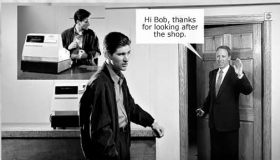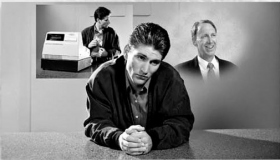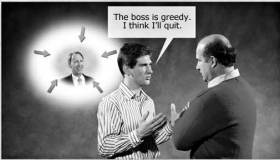When a person has committed an overt act and then withholds it, he or she usually employs the social mechanism of
We have all heard people attempt to justify their actions and all of us have known instinctively that justification amounted to a confession of guilt. But not until now have we understood the exact mechanism behind justification.
Short of applying Scientology procedures, there was no means by which a person could relieve himself of consciousness of having done an overt act except to try to lessen the overt.
Some churches and other groups have used confession in an effort to relieve a person of the pressure of his overt acts. However, lacking a full understanding of all the mechanisms at play, it has had limited workability. For a confession to be truly effective, revelation of one’s wrongdoing must be accompanied by a full acceptance of responsibility. All overt acts are the product of irresponsibility in some area or aspect of life.
Withholds are a sort of overt act in themselves, but have a different source. Scientology has proven conclusively that Man is basically good—a fact which
People withhold overt acts because they conceive that telling them would be another overt act. It is as though people were trying to absorb and hold out of sight all the evil of the world. This is wrongheaded. By withholding overt acts, these are kept afloat and are themselves, as withholds, entirely the cause of continued evil.
In view of these mechanisms, when the burden became too great, Man was driven into another mechanism—the effort to lessen the size and pressure of the overt. He or she could only do this by attempting to reduce the size and repute of the person against whom the overt was committed. Hence when a man or a woman has done an overt act, there usually follows an effort to reduce the goodness or importance of the target of the overt. Hence the husband who betrays his wife must then state that the wife was no good in some way. Thus the wife who betrayed her husband had to reduce the husband to reduce the overt. In this light, most criticism is justification of having done an overt.
This does not say that all things are right and that no criticism anywhere is ever merited. Man is not happy. And the overt act mechanism is simply a sordid “game” Man has slipped into without knowing where he was going. So there are rightnesses and wrongnesses in conduct and society and life at large, but random, nagging criticism, when not
This is a
Society is set up to punish most transgressions in one way or another. Punishment is just another worsening of the overt sequence and degrades the punisher. But people who are guilty of overts demand punishment. They use it to help restrain themselves from (they hope) further transgressions. It is the victim who demands punishment and it is a
When you hear
We have our hands here on the mechanism that makes this a crazy universe. Knowing the mechanism, it is possible to derive an effective handling to defuse it. There are further ramifications of it, however, which should be understood first.
the attempt to lessen an overt act by explaining how it was not really an overt act. See also overt act in this glossary.
is in direct, forceful opposition to or defiance of.
supported, backed up or confirmed.
also called dwindling spiral, the worse someone (or something) gets, the more capacity they have to get worse. Spiral here refers to a progressive downward movement, marking a relentlessly deteriorating state of affairs, and considered to take the form of a spiral. The term comes from aviation where it is used to describe the phenomenon of a plane descending and spiraling in smaller and smaller circles, as in an accident or feat of expert flying, which if not handled can result in loss of control and a crash.
stubborn in adherence to wrong opinion or principles.
a variation of the phrase hell hath no fury like a woman scorned, meaning no one has more fury or wrath than a woman whose love has been rejected, or who thinks her worth or dignity has been insulted, slighted, etc.
bitterly severe.




